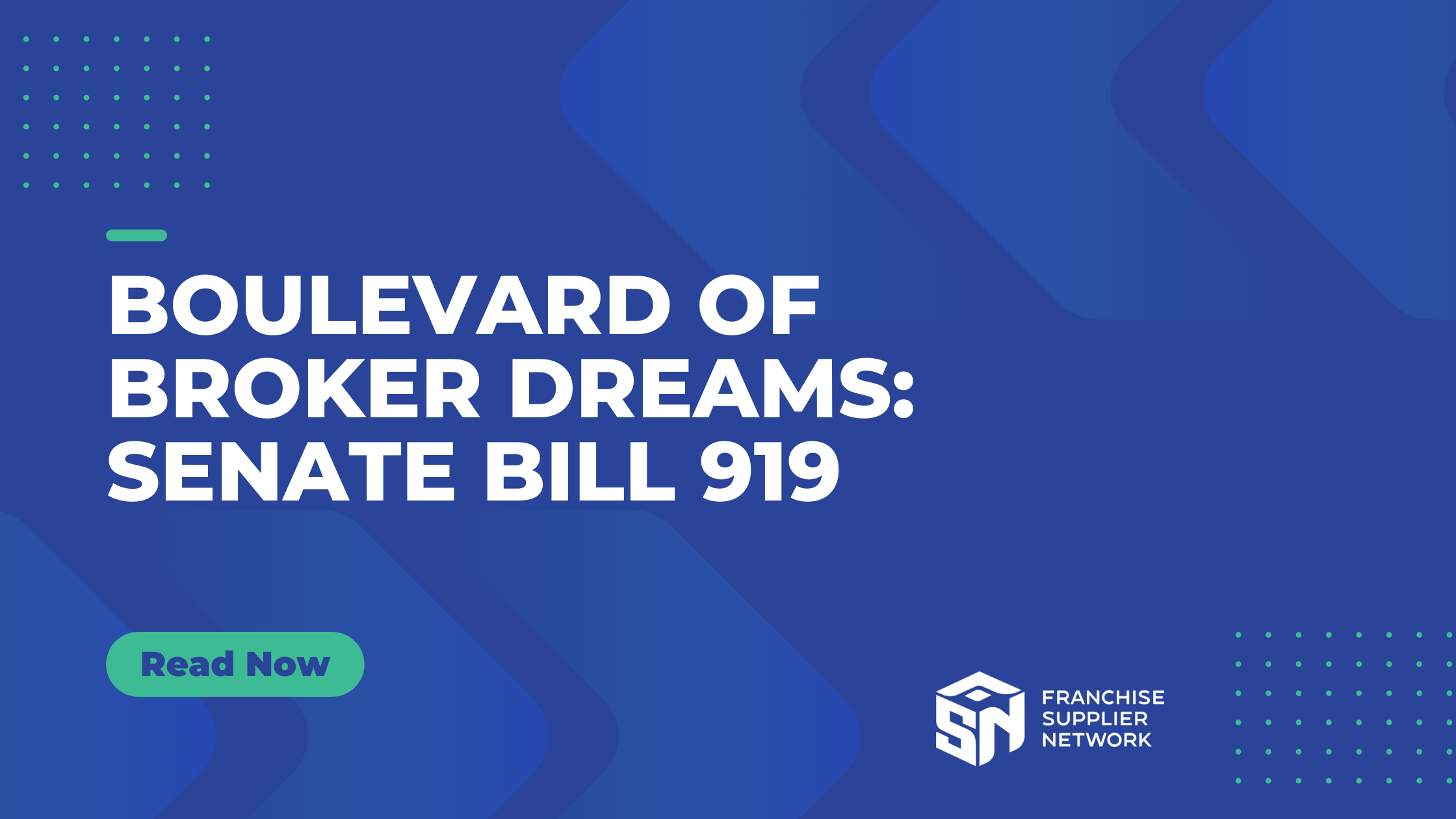Boulevard of Broker Dreams: Senate Bill 919 Explained

Premier franchise law firm Fisher Zucker is always keeping up to date with ever-changing franchise laws & regulations:
California’s proposed Senate Bill No. 919 (“Bill 919”) is indicative of a growing trend in the franchising industry to increase the regulation of franchise brokers and to shift the compliance burden to the brokers themselves. Historically, franchise laws have focused on requiring affirmative disclosures by franchisors so that franchisee prospects can obtain information about the franchise system to better understand the business opportunity that they are evaluating. While the vast majority of franchise registration states require franchisors to submit information about their third-party brokers in franchise seller disclosure forms, only two (New York and Washington), have historically required brokers to register themselves with the state.
If passed, Bill 919 would require third-party franchise sellers, colloquially known as franchise brokers, to register with the State of California. The fee for a franchise seller filing an initial registration application is $250, with a $150 annual renewal fee and $50 fee to amend a registration upon a material change to the application information. More notably, Bill 919 goes above and beyond the registration requirement, which is also found in New York and Washington law, by adding a disclosure component.
Under Bill 919, franchise brokers would be required to disclose some of the information that is traditionally provided by franchisors in their Franchise Disclosure Document (“FDD”). Specifically, brokers must submit a Uniform Third-Party Franchise Seller Disclosure Form and a Uniform Third-Party Franchise Seller Disclosure Document (“FSDD”) along with their registration application. In addition to registering the FSDD with the state, franchise sellers must also present this document to a prospective franchisee prior to engaging with them about a franchise opportunity.
The FSDD must include the following information:
- A cover page containing standardized and general language that is not specific to a particular broker and will include, at a minimum, the following information
- A description of the types of franchise sellers
- A seller’s role in the sales process
- The services a seller might provide
- Methods of compensation for a seller’s services
- Examples of questions a prospective franchisee might ask a seller
- General information about the specific seller’s legal and trade names, state and year of formation, principal address, owners and key personnel, and contact information
- The franchise seller’s professional experience during the last five years
- Administrative, civil, or criminal actions against the seller within the last five years alleging fraud, unfair or deceptive practices, or similar violations (which aligns with the types of matters disclosed in Item 3 of a franchisor’s FDD)
- The industries a seller represents and the number of brands within each industry
- A description of services provided by the seller
- How the seller is actually compensated, including how the amount of compensation is calculated
- Whether a broker network/organization or franchise sales organization may receive additional consideration
- The name and contact information for every franchisee that the seller sold a franchise to anywhere in the United States during the last calendar year, including the number of units sold to each franchisee
While not nearly as extensive as the FDD’s disclosure obligations, Bill 919’s FSDD tracks some of the types of items that must also be disclosed by franchisors, such as litigation history and fee structure.
With respect to enforcement, Bill 919 creates a cause of action that allows franchisees to sue for damages and rescission if the seller violates the law with respect to a franchise sale. Additionally, the California commissioner can issue a stop order prohibiting a franchise seller from offering or selling franchises in the state if it finds that a seller has failed to comply with any applicable provisions of law or rules issued by the commissioner.
The bill is not limited to sellers located in the State of California. The new rules and penalties will also to any scenario when a prospective franchisee is a resident of California, has its principal place of business in California, or if the franchised business is located in California; this essentially extends the scope of Bill 919 to any franchise broker that wishes to sell franchises that will be located in California or sell franchises to prospects located in California.
Furthermore, as none of the mandatory disclosure items are limited to California sellers or California franchisees, it appears that Bill 919 may have a secondary purpose of creating a template for the regulation of franchise sellers on a nationwide level. Coupled with the fact that the International Franchise Association assisted in crafting this bill, we view Bill 919 as a bellwether of more regulation to come, either from additional registration states acting individually or through the North American Securities Administrators Association (NASAA). Sponsored by Senator Tom Umberg, Bill 919 is being considered by the Rules Committee and would go into effect July 1, 2025.
Get connected with Fisher Zucker here!
Back
